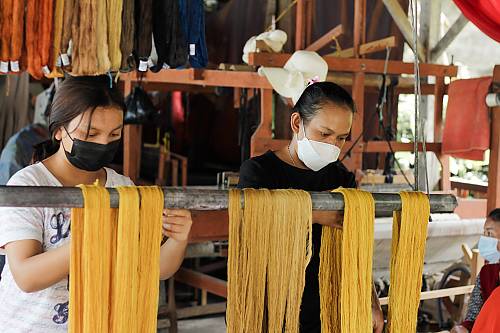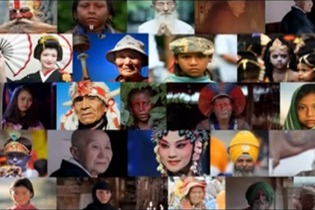Young practitioners in Toba, Indonesia, lead the post-pandemic recovery
 |
| Silvia Sibarani and Erna Hutagalung, young Ulos weavers from North Tapanuli, Toba experimenting natural dye during a UNESCO workshop © UNESCO |
The pilot project Recovery of living heritage from the COVID-19 pandemic: Ulos weavers and Gorga sculptors in the Toba region in Indonesia. This, is one of the eight pilot projects that are currently implementing the recommendations for post-pandemic recovery, presented in the UNESCO report “Living Heritage in the Face of the COVID-19 Pandemic”.
Between July and November 2021, six senior Ulos weavers received training on natural dye to train, in turn, 18 young weavers. At the same time, 15 Gorga sculptors learned to use alternative eco-friendly materials, such as wood scraps and chemical-free paint, enhancing the sustainability of their practice. Fifty-five of them further learned how to develop stories and audiovisual materials about their living heritage tailored for social media, raising awareness regarding this craft.
In the process, one of the Gorga sculptors, Jersal Tambun emerged as a young leader volunteering to promote his Pardolok Lumban Lobu Village as a new tourism destination centered around the promotion of the local intangible cultural heritage. Sartika Sihombing, an experienced Ulos weaver, became a member of the government team contributing to the preparation of a possible nomination on Ulos. In addition, six young artisans led public awareness sessions that took place at the State University of Medan in Northern Sumatra.
The project has demonstrated that living heritage can be a valuable resource for the smooth recovery of communities affected by conflicts and disasters, such as the COVID-19 pandemic. UNESCO will therefore continue working with these young artisans to nurture this new synergy.
In April 2020, the Living Heritage Entity launched an online survey to grasp the impact of the COVID-19 pandemic around the world. The “Living Heritage in the Face of the COVID-19 Pandemic” report summarizes the results of the survey and the challenges and opportunities for living heritage during this crisis. Furthermore, three key recommendations provide essential insight about how to integrate living heritage into post-pandemic recovery plans. UNESCO launched eight pilot projects based on the above-mentioned recommendations, implemented by Field Offices.

Address: 81, Laiguangying West Road, Chaoyang District, Beijing, China
Zip Code: 100021
Tel: 86-10-64966526
Fax: 86-10-64969281
E-mail: crihap@crihap.cn
Leave us your e-mail address, we'll let you know about current events.



